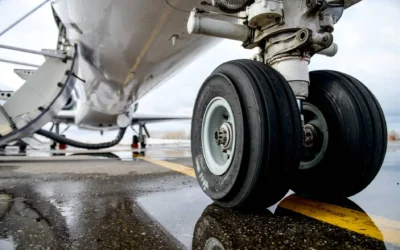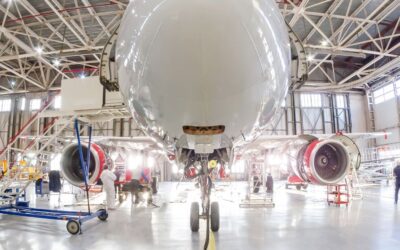Aerospace engineering is an increasingly popular career path. With so many advancements in aerospace technology, from unmanned aircraft to space travel, there are many new and exciting opportunities for professionals to pursue. Employment in the aerospace industry is growing steadily at a rate of 6% every year. In addition, the aerospace engineering field offers competitive salaries and the chance to play a role in bringing innovative, cutting-edge technology to life.
Aerospace Engineering Career Path
Aerospace engineering can be a fairly competitive field. However, if you are an aspiring aerospace engineer, you can take early steps toward a successful career path. Strategies include focusing on math and science coursework, seeking internship and co-op experiences, and considering a master’s degree in the future.
Math & Science Centered Schooling
Education is the first step toward a successful career in aerospace engineering. Aspiring aerospace engineers can take the first steps by focusing on chemistry, physics, and mathematics coursework as early as high school. Math is especially important in any type of engineering, and working hard in high school can pave the way for you to take even more advanced math classes once you reach college.
Once you enter higher education, you should pursue degrees in engineering or a related field. Additional coursework in chemistry, physics, and math at the collegiate level is also highly beneficial since those skills will support their core curriculum and likely come in handy in the future. You might also consider taking a few courses in computer science and software engineering, since the skills taught in these courses may also benefit their career aspirations.
Internships & Co-op Experiences
Co-ops have been part of the engineering experience for over one hundred years. Co-ops are an excellent opportunity to learn on-the-job skills, such as communication, client management, relationship building, problem-solving, and other skills that can’t be learned in a classroom. Spending time in an active work environment gives you a chance to learn how people use the products, how to market different products, and how to apply engineering fundamentals to real-world problems. And while not all co-op experiences lead to job offers, it’s not uncommon for co-op students to become employees at the same company after graduation.
Consider a Master’s Degree
Not every aerospace engineering job requires a master’s degree. Many engineers go their entire careers with just a bachelor’s degree and enjoy great success. However, there are some roles that do require an advanced degree, specifically a Master of Science in Aerospace Engineering (MSAE). If you have aspirations of leadership and advanced technical roles, a master’s degree can be extremely beneficial.
Some colleges and universities offer five- or six-year programs that combine a bachelor’s and master’s degree into one streamlined program. This allows young professionals to enter the workforce having already earned an advanced degree, which can open up more job opportunities for them as they begin their careers. That being said, plenty of aerospace engineers choose to go back to school later in life to earn their master’s degree.
Job Growth for Aerospace Engineers
As previously stated, the job market for aerospace engineers is expected to grow by 6% every year, with new opportunities appearing all the time. And there is no single path forward for someone interested in a career in aerospace engineering. An aerospace engineering professional can explore countless possibilities, including:
- Designing aircraft and spacecraft.
- Designing the parts, components, and systems within an aircraft as a mechanical engineer.
- Building blueprints and technical schematics as a drafter.
- Leading teams of engineers and support staff.
- Working directly with customers in a sales or business development role.
- Teaching aerospace engineering to college, university, and grad school students as a professor.
There are so many different jobs for aerospace engineers, all of which allow you to pair your passion for aerospace engineering with other talents and interests.
It’s also worth noting that there are multiple fields within the aerospace engineering industry that person may be interested in. In addition to commercial aircraft, there are robust sectors for military aircraft, private aircraft, and space exploration, along with academia.
Growth and Experience With NMG
NMG Aerospace has worked incredibly hard to cultivate a work environment where everyone can thrive. We have invested considerable energy and resources into creating a workplace culture where each and every one of our employees feels supported and motivated to do their best.
We provide all of the standard employee benefits, such as paid holidays and time off, a 401k plan, full medical, dental, vision, and prescription benefits, and short- and long-term disability. But we’ve added additional benefits over the years to meet the changing needs of the American worker, including:
- Flexible schedule options.
- Reimbursements for safe, workplace-appropriate shoes and prescription safety eyewear.
- Leadership development programs and other workplace learning opportunities.
- Tuition assistance.
- Multiple healthcare expense support options, include a flexible spending account (FSA), health savings account (HSA), and an annual wellness reimbursement allowance.
- Employee events, activities, and free tickets.
We also understand that starting a new job, even your dream job, can be stressful and overwhelming. All of our new hires go through a carefully curated onboarding experience that’s designed to make the transition as smooth as possible. The process includes comprehensive safety and quality orientations, continuous improvement training, and opportunities to connect with and befriend their new colleagues right away. New hires are also assigned a workplace mentor or “buddy,” someone they can turn to with questions as they learn the ropes.
NMG Aerospace believes strongly that excellent work begins with excellent employees who feel empowered to bring their best every single day. We’re always looking for new team members who share our passion for aerospace engineering and want to join the NMG family. To learn more about what we offer our valued employees, check out our benefits >




0 Comments